
Discharged "dyed" Mandalas: no dye added
March 2003
All three of the pictures below link to larger copies of
themselves.
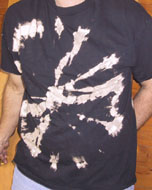


How I did it
folding
 See Tie-dyeing
Mandalas and Stars for the mandala fold. In example 23, my folded tie-dyed mandala
with white background, I carefully ironed each pleat flat,
up-down-up-down-up-down. However, in the case of these two
shirts, I simply folded them by hand. With no iron, and with
the considerably thicker fabric of the Hanes Beefy Tees I
was using, the pleats ended up being less uniform. After
folding as pictured below with the navy blue shirt, I tied
it very tightly by wrapping artificial sinew, from the local
crafts store, around and around, as you can see on the black
shirt, shown tied, to the right. The two shirts were tied
very nearly identically.
See Tie-dyeing
Mandalas and Stars for the mandala fold. In example 23, my folded tie-dyed mandala
with white background, I carefully ironed each pleat flat,
up-down-up-down-up-down. However, in the case of these two
shirts, I simply folded them by hand. With no iron, and with
the considerably thicker fabric of the Hanes Beefy Tees I
was using, the pleats ended up being less uniform. After
folding as pictured below with the navy blue shirt, I tied
it very tightly by wrapping artificial sinew, from the local
crafts store, around and around, as you can see on the black
shirt, shown tied, to the right. The two shirts were tied
very nearly identically.
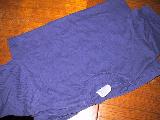
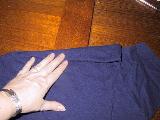
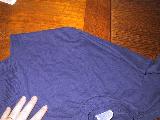
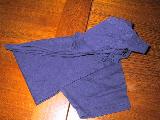
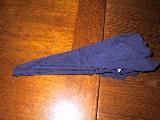
Discharging
I used "ultra" (slightly more concentrated the the old
"regular") household chlorine bleach, diluted in water, in a
somewhat narrow pitcher so that I could stick the point of
the bundled cone down into it while leaving the unbound part
of each shirt out of the water.
Step one was to fill the washing machine with water, to the
highest level, so that it would be ready.
First I tried 1/4 cup (60 ml) of the bleach in about a quart
(liter) of water. When I put the black shirt in, results
were quick. I took it out, and, since I did not have the
cheaper (in bulk) Anti-chlor from PROchem or equivalent
Bleach Stop from Dharma (see Sources for Dyeing
Supplies), I poured household 3% hydrogen peroxide over
the shirt, unwrapped the ties (cutting them with a blunt
child's scissor), then immediately place it in the washing
machine, including some strong percarbonate oxygen "bleach"
in the wash as further insurance that the chlorine bleach
would be safely inactivated.
When I unwrapped the black shirt and the white patterns
emerged (actually more of a tan before washing),
six-year-old Peter, who was watching, exclaimed in
amazement. He was very impressed, and
wanted me to do one for him. I had another commercially dyed
Hanes Beefy Tee in his size, though it was navy, rather than
black, so I immediately did so. This time, there was no
result at all. The navy dye was far more resistant to
chlorine bleach than the black dye had been. I added more
bleach, and saw a very slight response. Bored, I went off to
play a game with Peter, returning to check every few
minutes. After perhaps half an hour, I decided that no
further discharging of the dye would occur, so I took it
out, rinsed it with water and then peroxide,
and washed it with the black shirt. I can't help but wonder
if the extended time it spent in the bleach degraded the
fabric and shortened its lifespan, but only time will
tell. It seems just fine, right now.
Different results
As you can see, the results were very different. The short
time the black shirt spent in the dye meant that only the
outermost layers were affected at all. The long time the
navy shirt spent in the bath meant that the bleach
penetrated throughout, resulting in a spider-web like
pattern. In both cases, the dark lines left where the ties
had covered were distinct and interesting. Note that the
back of the navy shirt, which was inside the bundle, has a more
even pattern than the front. The back of the black shirt is
not shown because it is nearly identical to the front.
Both would make
interesting colorful mandalas, if the discharged regions
were bleached, but Peter likes the pinkish spiderweb pattern
on his navy shirt just the way it is, for now, and doesn't want any
dye added. I plan to dilute the bleach considerably more if
I do another black shirt, as the effects on the navy shirt
are intriguing. Of course, you can never be quite sure how
consistantly one item will bleach, as compared to a previous
one. Many times, blacks are made up of various different dye
combinations, so two apparently identical fabrics or garments may
discharge completely differently. As I write this (in the
spring of 2003), Dharma has just started carrying blacks
to discharge, which may be more predictable.


Home Page
Hand Dyeing Top
Gallery
About Dyes
How to Dye
How to Tie Dye
How to Batik
Low Water Immersion Dyeing
Sources for Supplies
Book Reviews
Other Galleries
Groups
FAQs
Custom Dyers
Forum
Q&A blog
link here
search
contact me
Page created: March 30, 2003
Last updated: March 30, 2003
Downloaded at: Sunday, February 22, 2026





 See Tie-dyeing
Mandalas and Stars for the mandala fold. In example 23, my folded tie-dyed mandala
with white background, I carefully ironed each pleat flat,
up-down-up-down-up-down. However, in the case of these two
shirts, I simply folded them by hand. With no iron, and with
the considerably thicker fabric of the Hanes Beefy Tees I
was using, the pleats ended up being less uniform. After
folding as pictured below with the navy blue shirt, I tied
it very tightly by wrapping artificial sinew, from the local
crafts store, around and around, as you can see on the black
shirt, shown tied, to the right. The two shirts were tied
very nearly identically.
See Tie-dyeing
Mandalas and Stars for the mandala fold. In example 23, my folded tie-dyed mandala
with white background, I carefully ironed each pleat flat,
up-down-up-down-up-down. However, in the case of these two
shirts, I simply folded them by hand. With no iron, and with
the considerably thicker fabric of the Hanes Beefy Tees I
was using, the pleats ended up being less uniform. After
folding as pictured below with the navy blue shirt, I tied
it very tightly by wrapping artificial sinew, from the local
crafts store, around and around, as you can see on the black
shirt, shown tied, to the right. The two shirts were tied
very nearly identically.




